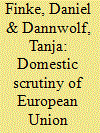| Srl | Item |
| 1 |
ID:
123009


|
|
|
|
|
| Publication |
2013.
|
| Summary/Abstract |
Some European law proposals are subject to scrutiny by national parliaments while others go unchecked. The analysis in this article indicates that the opposition scrutinises European Union law to gather information on the proceedings inside the Council of Ministers and the European Parliament. Yet whereas strong opposition parties scrutinise highly politicised law proposals, weak opposition parties tend to scrutinise those proposals that are negotiated under the non-transparent fast-track procedure. In addition, there is ample evidence that the leading minister initiates scrutiny in order to strengthen his or her intergovernmental bargaining leverage. Yet, this Schelling Conjecture presumes that the party of the minister is located between the expected bargaining position in the Council and the coalition partner. Any other domestic interest constellation could lead to scrutiny motivated by whistle blowing. However, an issue's salience helps us to separate the whistle blowing from the Schelling Conjecture.
|
|
|
|
|
|
|
|
|
|
|
|
|
|
|
|
| 2 |
ID:
137063


|
|
|
|
|
| Summary/Abstract |
How do political parties with different policy-making interests and veto power respond to international terrorism—can coalition parties and bicameral legislatures overcome their policy-making tensions and form a unified front for adopting counterterrorist measures? This study examines German counterterrorist legislation before and after the attacks of 9/11 by using a dictionary-based computerized text analysis. Our findings demonstrate that in times of low threat, the level of intra-coalition and bicameral conflict decreases the likelihood of counterterrorist legislation. However, in the event of a high external threat, this effect disappears despite the continuing divergence in partisan policy preferences. This suggests that a high external threat imposes inaction costs on political parties, which they attempt to avoid by adopting counterterrorist measures in the legislative arena.
|
|
|
|
|
|
|
|
|
|
|
|
|
|
|
|
| 3 |
ID:
120871


|
|
|
|
|
| Publication |
2013.
|
| Summary/Abstract |
Governmental preferences are crucial to our understanding of European and international treaty reforms. Nevertheless, current research fails to explain why and under what circumstances governments prefer certain proposals for institutional reform. The present article analyzes the conditional nature of governmental reform preferences over different dimensions of institutional design. In doing so, it integrates endogenous and exogenous explanations for governmental reform preferences into a single theoretical framework. The longitudinal research design enables an explicit empirical analysis of the observed short-term changes in the governments' positions on European treaty reforms. In terms of political integration, these changes not only represent short-term trends in public opinion but also reflect the partisan composition of governments and parliaments. Both causal effects are mediated by the institutional design of the domestic preference aggregation process. With respect to institutional reforms, the governments' changing positions can be explained as a reaction to previous treaty reforms. Given a particular level of political integration, governments optimize the trade-off between decision-making power and efficiency. Hence, I find that preferences on political integration and institutional reform are conditional upon each other, with the direction and strength of this conditionality varying systematically across member states and changing over time.
|
|
|
|
|
|
|
|
|
|
|
|
|
|
|
|